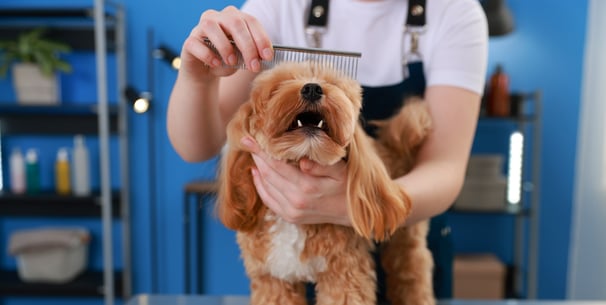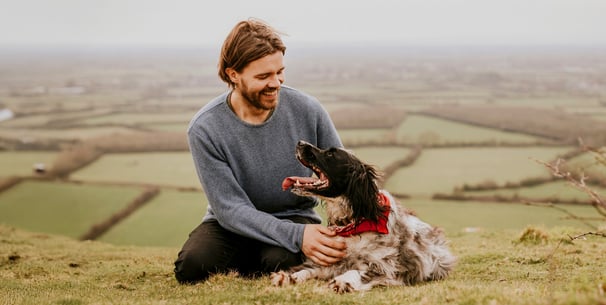You may not always feel like you're in sync with your pet, and that's fine. We've collected all the information we think might help you to reach peak pet parent. Subscribe to get the freshest posts, straight to your inbox.
Golden Retriever Training Tips and Tools - Guide to Train a Golden Retriever
Index:
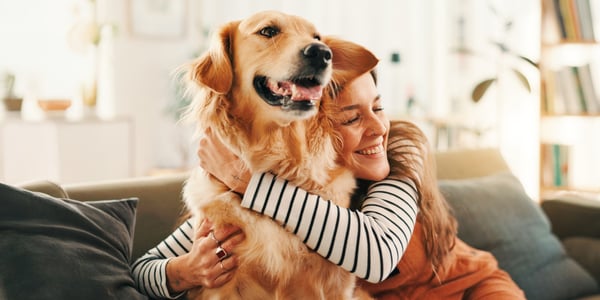


Introduction
Bringing a Golden Retriever into your home can feel like adding a bundle of joy and energy to your family.
These dogs are known for their friendly nature and eagerness to please. But training them takes patience and the right approach.
We all want our furry friends to thrive, and with some helpful tips, you can make that happen.
Whether you're a first-time dog owner or have experience, this guide to Golden Retriever training will walk you through the basics and beyond.
Let's get started on helping you train your Golden Retriever with confidence.
Key takeaways
Golden Retrievers are easy to train thanks to their intelligence and friendly nature, but consistency is key.
Start with positive reinforcement and basic commands to build a strong bond.
Incorporate fun tools and activities to keep training sessions engaging for your puppy or adult dog.
Address common concerns like potty training and leash training early to avoid issues.
Regular exercise and socialisation help your Golden Retriever become a well-rounded companion.
Ready to train a Golden Retriever?
Golden Retrievers are a popular dog breed in the UK. They often top lists of family favourites. But why focus on training?
Well, these dogs are smart and full of energy. Without guidance, that energy can lead to mischief. Think chewed shoes or endless barking. We get it; as Golden Retriever owners, we've all been there. Training helps channel their enthusiasm into good behaviour.
These dogs are eager to please, which makes them responsive to training methods.
Start early, especially with a new puppy. It sets the tone for a happy life together. And hey, it's fun! Watching your Golden Retriever pup learn new tricks brings a smile to your face.
If you're getting a puppy, check out our puppy essentials guide for tips on starting strong.
Understanding the breed
The Golden Retriever is a breed that originated in Scotland. They were bred for retrieving game, so they love fetching and water. This background means they're active and need mental stimulation. As a Golden Retriever specialist, I can tell you they're gentle but can be boisterous as puppies.
Golden Retrievers often have a lifespan of 10-12 years. Puppies grow fast, reaching adult size by about 18 months.
Senior Golden Retrievers might need gentler training. Know your dog's age and energy level. For more on the breed, see our Golden Retriever breed guide.
Fun fact: These dogs are great with kids, but always supervise playtime.
Their size can accidentally knock over little ones. We love how they fit into family life, though. They literally think they are the most important kid in the household, which can lead to some truly endearing moments.

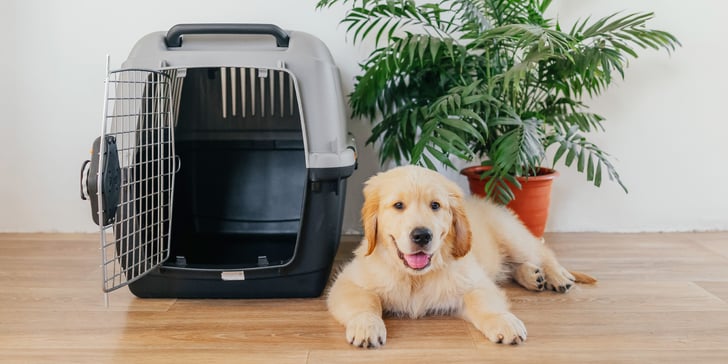

Getting started with training
Ready to start training? Begin with the basics. As we stated earlier, Puppy training is crucial for a new Golden Retriever. Set up a routine right away.
Use positive reinforcement – that's rewarding good behaviour with treats or praise.
Choose a quiet spot for training sessions. Keep them short, about 5-10 minutes. Your puppy has a short attention span. Be patient. If things get frustrating, take a break. Remember, you're building trust.
For first-time dog owners, consider professional help. A dog trainer can guide you. Or try online Golden Retriever training resources. They're handy for busy schedules.
Basic commands every Golden should know
Teaching basic commands is a must. Start with "sit," "stay," and "come." These keep your dog safe. Use treats to reward success. Say the command clearly, then guide gently.
For example, to teach your puppy to sit, hold a treat above their nose. Move it back slowly. Their bottom will drop. Say "sit" and reward. Repeat often.
Obedience training builds from here. Practice in different spots to make it stick. Soon, your Golden Retriever dog will respond reliably.
Potty training tips
Potty training can be a challenge. But with consistency, it's doable. Take your puppy outside often. Do this after meals, naps, and play. Praise them when they go in the right spot.
Use a crate for crate training. Dogs don't like soiling their personal space. Make the crate comfy with toys. Never use it as punishment, though. More on this below.
Accidents happen. Clean up without fuss. Empathy goes a long way; just remember that your new dog is learning. For more on this, read our puppy toilet training guide.
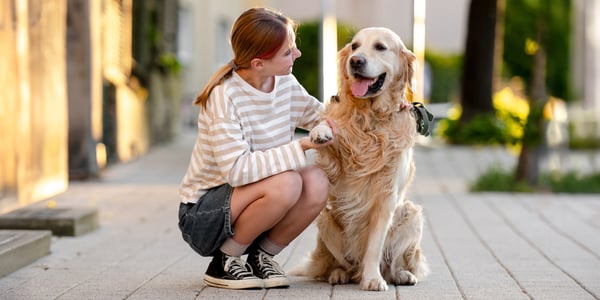


Lead training and walking
Lead training prevents pulling. Start indoors with a loose leash. Walk and reward them when they stay by your side. If they pull, stop and wait.
Golden Retrievers love walks. Aim for at least two hours of exercise daily. It burns energy and strengthens your bond. Vary routes to keep it exciting.
For tips on walking distances, check how far a Cockapoo can walk – similar principles apply to active breeds like yours.
Crate training benefits
Crate training gives your dog a safe den. It helps with house training and travel. Introduce it slowly. Put treats inside to encourage entry.
Never force them in. Make it positive. Over time, your Golden Retriever will see it as their spot. Useful for vet visits or car trips.
Positive reinforcement techniques
We may say it a lot, but positive reinforcement is the way to go. Reward good actions with treats to reward or play. Ignore bad behaviour or redirect it.
This method builds confidence. Your dog learns what you want without fear.
It's effective for teaching your Golden new skills.
Again, mix in praise. A happy "good boy!" means a lot.
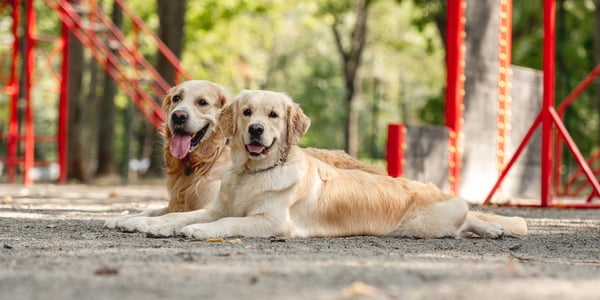


Dealing with common issues
Every dog owner faces hurdles. Golden Retriever puppies might chew or jump.
Redirect chewing to toys. For jumping, turn away and ignore until calm.
If your dog barks a lot, find the cause. Boredom? More exercise helps.
Empathy is key; they're not being naughty on purpose.
For separation anxiety, build up alone time slowly. Our separation anxiety guide has more tips.
Nutrition and training
Good Golden Retriever dog food supports training. A balanced diet helps maintain steady energy levels. Avoid overfeeding, as these dogs can gain weight.
Use treats wisely in training. Opt for healthy ones. For picky eaters, try puzzle feeders to make meals fun.
Fun training tips and tools
Let's make training enjoyable. Incorporate these ideas to keep your Golden Retriever engaged. We've searched the web for UK-relevant tips, like those from the PDSA Golden Retriever guide, which stresses positive methods.
Incorporate clicker training to mark desired behaviours precisely during sessions, helping with commands like "spin" or "high five"; get started with the Coachi Whizzclick Dog Clicker.
Set up a simple home agility course to build confidence and coordination, using tunnels or jumps for fun obstacles; check out agility accessories from Zooplus UK.
Encourage natural swimming instincts for low-impact exercise and entertainment, especially in warmer months; pair it with a durable fetch toy like the Chuckit! Ultra Ball for water play.
Play hide-and-seek games by concealing treats around the house to sharpen scent-tracking skills; enhance it with a Snuffle Snake toy for added challenge.
Provide tough chew toys during alone time to satisfy their urge to gnaw and reduce anxiety; opt for indestructible options like those from BULLYMAKE available via UK shipping.
Use treat-dispensing balls for mealtime to slow eating and promote problem-solving; try the KONG Classic for reliable durability.
Introduce puzzle feeders with varying difficulty levels to keep meals engaging; explore the Nina Ottosson Treat Puzzle for interactive fun.
Teach recall in distracting environments using a whistle for clear signals; combine it with another tool like the PetSafe Clik-R Training Tool for effective reinforcement.
Rotate toys weekly to maintain novelty and prevent habituation; stock up on variety from Lords & Labradors interactive collection.
Engage in tug-of-war with safe, durable ropes to strengthen bonds and burn energy; select from Tug-E-Nuff or other toys in this helpful guide for high-quality options.
These tips, inspired by sources like Chewy's 10 Tips for Training Your Golden Retriever, add variety to your routine.
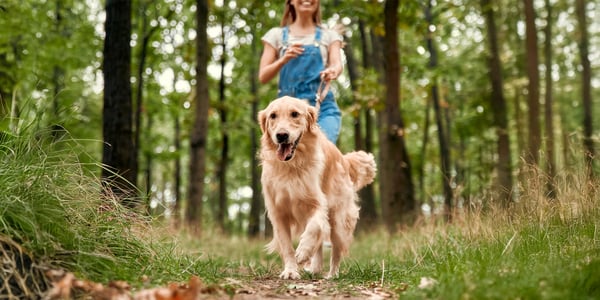


Advanced training ideas
Once the basics are down, try advanced stuff. Obedience classes or agility can challenge your dog. Golden Retrievers excel in these.
Consider a training program with a pro. It helps with the different training needs for each individual Golden.
For online options, look into Good as Golden's specialist training.
Socialisation and play
Socialise early. Expose your puppy to people, dogs, and sounds. It prevents fear later.
Playdates build skills. Take your puppy to parks. Watch for positive interactions.
Our socialising your puppy guide is a great resource.
When to seek professional help
If issues persist, get training and help. A dog trainer can spot problems you miss.
For behavioural quirks, training services like those from the AKC Golden Retriever training timeline offer structured advice.
Don't hesitate, it's okay to ask for support. We're all in this together.
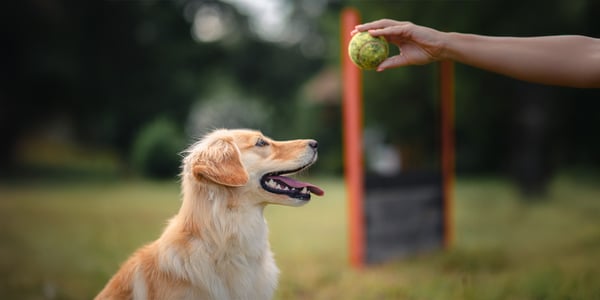


Budgeting for training
Training costs add up. Factor in classes, tools, and treats. Plan ahead to avoid surprises.
For cost tips, read 'budgeting for a Golden Retriever'.
Final thoughts
Training a Golden Retriever is rewarding. With these training tips, you'll have a well-behaved pal. Remember, consistency and love are key. Enjoy the journey!
Waggel Pet Insurance
Need more help? You're in luck if you're a Waggel Pet Insurance member. Along with our excellent coverage, we offer access to a 24/7 online vet to answer all your sticky questions, especially if you need grooming assistance.
Not a member? Why not get a quote now and cover your furry friend for a range of illnesses, all while enjoying our amazing perks and rewards.
Want more like this?
Get updates from us with helpful info, advice, answers to frequently asked questions and much more.
Index:
- Introduction
- Ready to train a Golden Retriever?
- Understanding the breed
- Getting started with training
- Basic commands every Golden should know
- Potty training tips
- Lead training and walking
- Crate training benefits
- Positive reinforcement techniques
- Dealing with common issues
- Nutrition and training
- Fun training tips and tools
- Advanced training ideas
- Socialisation and play
- When to seek professional help
- Budgeting for training
- Final thoughts
Related posts:
Get your quote
Along with our excellent coverage, we offer access to a 24/7 online vet to answer all your sticky questions.
